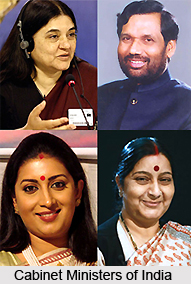| Narendra Modi |
Prime Minister of India |
| Shri Raj Nath Singh |
Home Affairs |
| Smt. Sushma Swaraj |
External Affairs |
|
Overseas Indian Affairs |
| Shri Arun Jaitley |
Finance |
|
Corporate Affairs |
|
Information & Broadcasting |
| Shri M. Venkaiah Naidu |
Urban Development |
|
Housing and Urban Poverty Alleviation |
|
Parliamentary Affairs |
| Shri Nitin Jairam Gadkari |
Road Transport and Highways |
|
Shipping |
| Shri Manohar Parrikar |
Defence |
| Shri Suresh Prabhu |
Railways |
| Shri D. V. Sadananda Gowda |
Law and Justice |
| Sushri Uma Bharati |
Water Resources, River Development and Ganga Rejuvenation |
| Dr. Najma A. Heptulla |
Minority Affairs |
| Shri Ramvilas Paswan |
Consumer Affairs, Food and Public Distribution |
| Shri Kalraj Mishra |
Micro, Small and Medium Enterprises |
| Smt. Maneka Sanjay Gandhi |
Women and Child Development |
| Shri Ananthkumar |
Chemicals and Fertilizers |
| Shri Ravi Shankar Prasad |
Communications and Information Technology |
| Shri Jagat Prakash Nadda |
Health and Family Welfare |
| Shri Ashok Gajapathi Raju Pusapati |
Civil Aviation |
| Shri Anant Geete |
Heavy Industries and Public Enterprises |
| Smt. Harsimrat Kaur Badal |
Food Processing Industries |
| Shri Narendra Singh Tomar |
Mines |
|
Steel |
| Shri Chaudhary Birender Singh |
Rural Development |
|
Panchayati Raj |
|
Drinking Water and Sanitation |
| Shri Jual Oram |
Tribal Affairs |
| Shri Radha Mohan Singh |
Agriculture |
| Shri Thaawar Chand Gehlot |
Social Justice and Empowerment |
| Smt. Smriti Zubin Irani |
Human Resource Development |
| Dr. Harsh Vardhan |
Science and Technology |
|
Earth Sciences |
| General V. K. Singh |
Statistics and Programme Implementation (Independent Charge) |
|
|
External Affairs |
|
|
Overseas Indian Affairs |
|
| Shri Inderjit Singh Rao |
Planning (Independent Charge) |
|
|
Defence |
|
| Shri Santosh Kumar Gangwar |
Textiles (Independent Charge) |
|
| Shri Bandaru Dattatreya |
Labour and Employment (Independent Charge) |
|
| Shri Rajiv Pratap Rudy |
Skill Development & Entrepreneurship (Independent Charge) |
|
|
Parliamentary Affairs |
|
| Shri Shripad Yesso Naik |
AAYUSH (Independent Charge) |
|
|
Health & Family Welfare |
|
| Shri Dharmendra Pradhan |
Petroleum and Natural Gas (Independent Charge) |
|
| Shri Sarbananda Sonowal |
Youth Affairs and Sports (Independent Charge) |
|
| Shri Prakash Javadekar |
Environment, Forest and Climate Change (Independent Charge) |
|
| Shri Piyush Goyal |
Power (Independent Charge) |
|
|
Coal (Independent Charge) |
|
|
New and Renewable Energy (Independent Charge) |
|
| Dr. Jitendra Singh |
Development of North Eastern Region (Independent Charge) |
|
|
Prime Minister"s Office |
|
|
Personnel, Public Grievances & Pensions |
|
|
Department of Atomic Energy |
|
|
Department of Space |
|
| Smt. Nirmala Sitharaman |
Commerce and Industry (Independent Charge) |
|
| Dr. Mahesh Sharma |
Culture (Independent Charge) |
|
|
Tourism (Independent Charge) |
|
|
Civil Aviation |
|
| Shri Mukhtar Abbas Naqvi |
Minority Affairs |
|
Parliamentary Affairs |
| Shri Ram Kripal Yadav |
Drinking Water and Sanitation |
| Shri Haribhai Parthibhai Chaudhary |
Home Affairs |
| Shri Sanwar Lal Jat |
Water Resources |
|
River Development and Ganga Rejuvenation |
| Shri Mohanbhai Kalyanjibhai Kundariya |
Agriculture |
| Shri Giriraj Singh |
Micro, Small & Medium Enterprises |
| Shri Hansraj Gangaram Ahir |
Chemicals & Fertilizers |
| Shri G. M. Siddeshwara |
Heavy Industries and Public Enterprises |
| Shri Manoj Sinha |
Railways |
| Shri Nihalchand |
Panchayati Raj |
| Shri Upendra Kushwaha |
Human Resources Development |
| Shri Radhakrishnan P |
Road Transport & Highways |
|
Shipping |
| Shri Kiren Rijiju |
Home Affairs |
| Shri Krishan Pal |
Social Justice & Empowerment |
| Dr. Sanjeev Kumar Balyan |
Agriculture |
| Shri Mansukhbhai Dhanjibhai Vasava |
Tribal Affairs |
| Shri Raosaheb Dadarao Danve |
Consumer Affairs, Food and Public Distribution |
| Shri Vishnu Deo Sai |
Mines |
|
Steel |
| Shri Sudarshan Bhagat |
Rural Development |
| Prof. (Dr.) Ram Shankar Katheria |
Human Resource Development |
| Shri Y. S. Chowdary |
Science and Technology |
|
Earth Science |
| Shri Jayant Sinha |
Finance |
| Col. Rajyavardhan Singh Rathore |
Information & Broadcasting |
| Shri Babul Supriyo |
Urban Development |
|
Housing and Urban Poverty Alleviation |
| Sadhvi Niranjan Jyoti |
Food Processing Industries |
| Shri Vijay Sampla |
Social Justice & Empowerment |
 Council of Ministers is formed under the leadership of the Prime Minister in the Republic of India. This Council comprises the Cabinet Ministers, Ministers of State and the Deputy Ministers.
Council of Ministers is formed under the leadership of the Prime Minister in the Republic of India. This Council comprises the Cabinet Ministers, Ministers of State and the Deputy Ministers.






